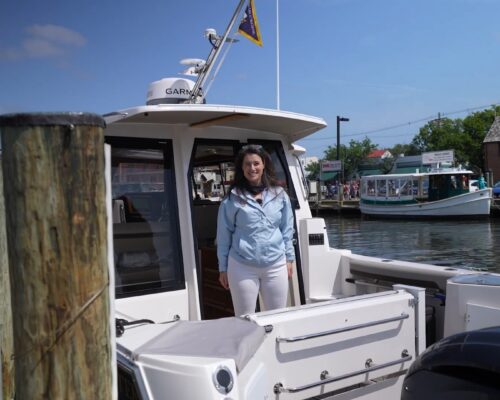Nautical ceremonies, whether a media-covered large public affair or a small gathering at a local boat club, have long been a tradition in admiralty dating back to a time when yachting was a royal pastime and pageantry demanded a full display both on the water and on shore. They were highly anticipated events and some of the oldest maritime traditions.
The history of christening a vessel dates back to the very beginning of sea travel and it is believed that the earliest ceremonies required blood to christen a vessel, though as time went on, the protocol became more civilized as more ships were placed into service.
Christening a boat is generally accompanied by cracking a champagne bottle against the hull or pouring or spraying some and announcing the new name. Commissioning occurs after the “keel laying” celebration in preparation for sea trials or a new owner— this tends to be a more elaborate event usually for boats entering military service. Recreational boaters can combine a launching with a christening in one grand event for guests and still be within the limits of acceptable maritime procedure.
We seldom see the quasi-naval blue blazers preferred by many yacht club officers at pleasure craft launchings and commissionings these days. But in the past, the blue coats were part of the customary etiquette, dating back to the time when they were worn by the crewmembers of HMS Blazer. Today—at a minimum—one’s best boat shoes are typically worn for these time-honored occasions.
Modernly it is interesting to note there is no strict formal ceremony that has ever been established for a naming ceremony. (The U.S. Navy only suggests some loose guidelines, with the actual planning and execution left up to the individual.)
We still celebrate launchings, namings and christenings of watercraft with much fanfare. After all, the naming or renaming of your craft should be done with the greatest of care and precision.
According to legend, each and every vessel is recorded by name in the Ledger of the Deep and is known personally to Neptune, the god of the sea. Superstitious mariners from the earliest of times have told tales of the unluckiest of ships—those that have defied Neptune and changed their names improperly. Thankfully there is a way to change a name without upsetting the sea deities by purging the old name from the ledger and from Neptune’s memory.
First, the boat must be “unnamed” by reciting these ceremonial words:
In the name of all who have sailed aboard this boat in the past,
and in the name of all who may sail aboard her in the future,
we invoke the ancient gods of the wind and the water to favor us with their blessing today.
Mighty Neptune, king of all that moves in or on the water;
and mighty Aeolus, guardian of the winds and all that blows before them:
We offer you our thanks for the protection you have afforded this vessel in the past.
(For a brand new boat you are naming for the first time, it would apply to its sea trial).
We voice our gratitude that she has always found shelter from tempest and storm
and enjoyed safe passage to port.
Now wherefore we submit this supplication, that the name whereby this vessel known as (old vessel name) be struck and removed from your records.
As proof thereof, we submit this ingot bearing her former name to be corrupted through your powers and forever be purged from Neptune’s log.
(If you have a tag with the boat’s original name, drop it from the bow into the water.)
Further we ask that when she again is presented for blessing with another name, she shall be recognized and shall be accorded once again the privileges she previously enjoyed.
Stay with me here. Now that you have unnamed the vessel, it is necessary to pour champagne west to east on the bow; then south to north saying:
We implore you mighty rulers to grant this vessel (new name) your kindness according to her needs, and let it be recorded this date ______, and forever more, this fine vessel is named (new vessel name.).
You who cause the waters to rage or lie in sweet repose,please list to we mariners here,your servants of the flows. This boat, crew and all of those who have the winds and waters — will follow where thee goes.
Guests then raise a glass in a toast “To Neptune!”
followed by: May God bless her, and all that sail in her.
Besides just being a fun celebration, a naming or christening ceremony dignifies your newly acquired vessel as officially becoming a part of the family and is an especially photogenic moment. Plus, mariners are profoundly superstitious, although many will say it’s just “tradition”. Whatever your belief, it is best to observe maritime customs to assure fair winds and calm seas and to forever stave off bad luck.
Joan Wenner is a longtime boating safety writer and lifelong sailor. Comments or questions are welcomed at: [email protected]



